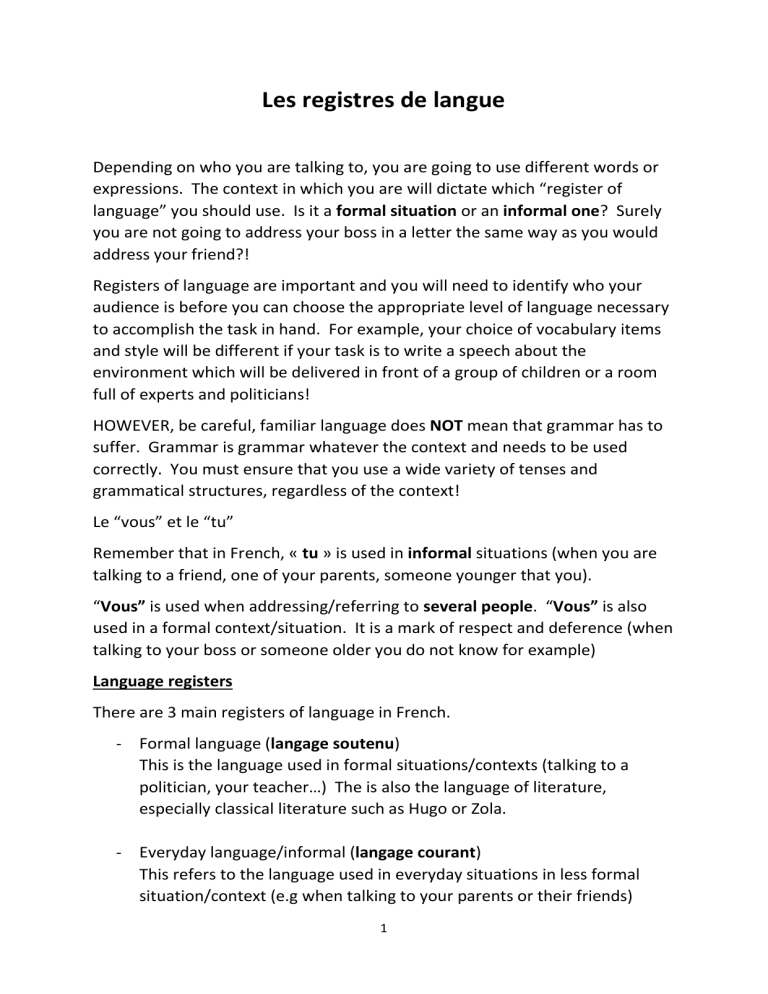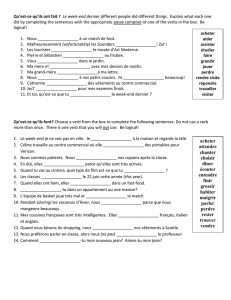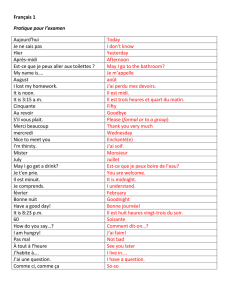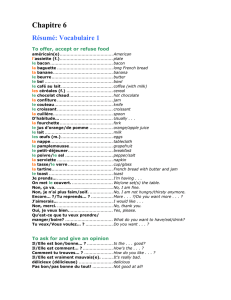Registres de langue française: formel, informel, familier
advertisement

Les registres de langue Depending on who you are talking to, you are going to use different words or expressions. The context in which you are will dictate which “register of language” you should use. Is it a formal situation or an informal one? Surely you are not going to address your boss in a letter the same way as you would address your friend?! Registers of language are important and you will need to identify who your audience is before you can choose the appropriate level of language necessary to accomplish the task in hand. For example, your choice of vocabulary items and style will be different if your task is to write a speech about the environment which will be delivered in front of a group of children or a room full of experts and politicians! HOWEVER, be careful, familiar language does NOT mean that grammar has to suffer. Grammar is grammar whatever the context and needs to be used correctly. You must ensure that you use a wide variety of tenses and grammatical structures, regardless of the context! Le “vous” et le “tu” Remember that in French, « tu » is used in informal situations (when you are talking to a friend, one of your parents, someone younger that you). “Vous” is used when addressing/referring to several people. “Vous” is also used in a formal context/situation. It is a mark of respect and deference (when talking to your boss or someone older you do not know for example) Language registers There are 3 main registers of language in French. - Formal language (langage soutenu) This is the language used in formal situations/contexts (talking to a politician, your teacher…) The is also the language of literature, especially classical literature such as Hugo or Zola. - Everyday language/informal (langage courant) This refers to the language used in everyday situations in less formal situation/context (e.g when talking to your parents or their friends) 1 - Colloquial language (langage familier) This refers to the language used in familiar or “very familiar” context. (with your friends) CAREFUL…familiar language does not suggest that you can use rude or inappropriate words! NB: When learning a new word, make sure you know to which register of language it belongs. Equally, if you can learn synonyms of a word in different registers, this could come in handy on the day of the exam BUT don’t panic if you can’t find synonyms for a word in a different register! Not all words have synonyms in all registers! Sometimes, one word will do whatever the context. Examples: Registre soutenu Registre courant Registre familier Un ami Un copain Un pote Ça me laisse indifférent Ça m’est égal Je m’en fous 2 Pratiquons! Tous les mots dans la colonne de gauche appartiennent au “registre courant”. Trouve leurs équivalents dans le “registre familier” et traduisles. 1) Une fille:________________________ a) dingue 2) comprendre:_____________________ b) des fringues 3) De l’argent_______________________ c) Du fric 4) se disputer:______________________ d) Se magner 5) un surveillant:____________________ e) Une nana 6) un policier:_______________________ f) Un flic 7) Fou:_____________________________ g) piger 8) mon frère:________________________ h) louche 9) bizarre:___________________________ i) s’engueuler 10) avoir de la chance:___________________________ j) avoir du pot/du bol 11) Des vêtements:_____________________ k) un pion 12) Se dépêcher:_______________________ l) 3 mon frangin Même exercice mais, cette fois, les mots dans la colonne de droite appartiennent au « registre soutenu » 1) écrire :______________ a) Aliéné/dément 2) Avoir peur de :_________________ b) réprimander 3) Disputer quelqu’un :___________ c) craindre 4) Etre en colère :______________ d) Rennoncer à 5) Fou :________________ e) rédiger f) Etre courroucé 6) Abandonner :______________ Pratiquons un peu plus ! As with most aspects of the language, the concept of “registres de langue” only truly takes its full meaning in context. Below is a task aimed at allowing you to both practice further and hopefully pick up a few more words too! Xavier passe ses vacances dans le sud de la France avec ses parents, mais les choses ne se passent pas bien. Il écrit ses sentiments dans son journal intime. La mère de Xavier trouve son journal par hasard et décide de le lire. Cependant, son utilisation du langage familier la surprend. Peux-tu l’aider en remplaçant les mots en caractère gras par leur équivalent en « langage courant » 4 Cher journal, J’en ai marre!! Ici c’est l’horreur ! Depuis que nous sommes arrivés dans ce bled 1 paumé 2 pour les vacances, rien ne va ! Il n’y a rien à faire ici le dimanche, il a draché 3 toute la journée ! Hier, je voulais aller en ville pour m’acheter des fringues 4 et des nouvelles godasses 5, mais mes vieux 6 ont refusé 7 de me filer la bagnole 8 ! J’ai l’impression qu’ils ne me font pas confiance. Tous mes potes 9 ont le droit de sortir quand ils veulent ! Pourquoi pas moi ?! C’est vraiment pas juste, mon cher journal ! En plus, mon petit frère m’énerve ! Il a toujours la dalle10 et il demande sans arrêt à quelle heure on va bouffer 11 ! Il est vraiment pénible Si j’avais su que les vacances seraient aussi galère 12, j’aurais cherché un boulot 13 pour l’été comme ça au moins j’aurais bossé 14 et j’aurais gagné de la tune 15 et en plus je n’aurais pas été obligé d’aller en vacances avec ma famille ! Ah qu’est-ce que je m’ennuie ! Je viens de finir mon bouquin 16. Qu’est-ce que je vais faire aujourd’hui ? Mes parents veulent que je les accompagne au marché ce matin ! Certainement pas ! J’ai pas envie de me taper la honte 17 ! J’en viendrais presque à regretter le bahut18…tu te rends compte, journal ! Moi qui déteste l’école !! C’est vraiment naze 19 ici et je sens que ces vacances vont être loupées 20 ! Ça me donnerait presque envie de chialer 21 ! Enfin bref, il faut que je te quitte mon cher journal car je dois aller déjeuner (tu vois ; il n’y a même pas moyen de faire la grasse mat 22 !) Alors à ce soir, journal. 5 Un peu d’aide… 1)_________________________________ Nul/travaillé/parents 2)_________________________________ Amis/pleurer/manger 3)_________________________________ Travail/perdu/livre Prêter/ratées/travail Etre embarrassé/ l’argent 4)_________________________________ 5)_________________________________ 6)_________________________________ Village/grasse matinée 7)_________________________________ Difficiles/lycée/voiture 8)_________________________________ A faim/a plu/vêtements 9)_________________________________ 10)_________________________________ 11) ________________________________ 12)_________________________________ 13)________________________________ 14)_________________________________ 15)_________________________________ 16)_________________________________ 17) _________________________________ 18)_________________________________ 6 19)_______________________________ 20)________________________________ 21)________________________________ 22)_________________________________ 7 Even though the notion of “registres de langue” mostly applies/refers to your choice of vocabulary, there are few other aspects that can be taken into account too. Abbreviations of words/forms It is possible to use a shorten version of certain words in familiar contexts such as: Les ados Les adolescents Une pub Une publicité Elle est trop perso Personnel (=selfish here) Un appart Un appartement Quelle cata! Quelle catastrophe! Mon prof de géo Mon professeur de géographie Negative forms with omissions of the “ne…pas” It is possible in familiar contexts, to drop the negative form in some expressions. C’est pas facile Ce n’est pas facile= c’est difficile C’est pas vrai ! Ce n’est pas vrai != C’est faux ! C’est pas possible Ce n’est pas possible= c’est impossible 8 Y’a pas photo Il n’y a pas photo= c’est évident/il n’y a aucun doute Use of adverbs It is possible to use adverbs such as “trop”/”vachement” or carrément” in familiar contexts to insist on something or even exaggerate. J’aime beaucoup ce film. Il est trop bien ! La meilleure amie de ma sœur est vachement canon ! (« canon » (fam)= pretty). Eteins ta clope, c’est interdit de fumer ici. De toute façon, c’est carrément naze de fumer ! (« clope » (fam)= cigarette/ »naze » (fam)=nul Use of words/verbs/adjectives in a different meaning. It is possible to use words in familiar contexts but use them in the opposite meaning as their usual meaning. It is a form of irony. It is also possible for some words/verbs/nouns etc…to take a totally different meaning in a familiar context. Je rêve! C’est incroyable! Je n’y crois pas ! Tu m’étonnes Tu ne m’étonnes pas du tout ! Génial ! Super ! They can be used to mean “great!” but they can also be used to express the opposite. 9 C’est mortel! Il est lourd/il est grave Again, this expression can be used to mean “it is boring!” or “it is fantastic” or even “No chance”! Il est nul/ennuyeux… Ça craint ! C’est nul ! NB : Don’t forget that some verb tenses such as the past historic (passé simple) will be out of place in familiar contexts. 10



